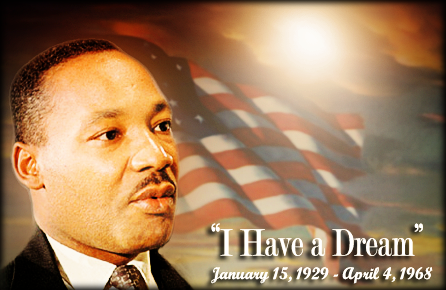Hiya BetterMost friends.

I think that's a fitting birthday cake for me and this site.

Many thanks to everyone who came here, or to the bday thread here, or my facebook page. It was great to see all the greetings.

You made my day! It was a quiet day, slept in, surfed the 'net, did some reading, worked out and went shopping.
Brother and sister-in-law will be down next Sunday, so that's when the family will celebrate.

1929 Martin Luther King, Jr., is born in Atlanta to teacher Alberta King and Baptist minister Michael Luther King.
1944 Graduates high school at age 15, enters Morehouse College shortly thereafter.
1948 Receives BA in sociology from Morehouse College at age 19.
1951 Receives degree from Crozer Theological Seminary (Chester, Pa.), enrolls in Boston University Ph.D program.
1953 Marries New England Conservatory music student Coretta Scott; they eventually have four children.
1954 Becomes minister of Dexter Avenue Baptist Church, Montgomery, Alabama.
1955 Receives Ph.D in systematic theology from Boston University.
1955 The 26-year-old King leads boycott of segregated Montgomery buses, gains national reputation.
1956 King's house is bombed
1956 U.S. Supreme Court ruling prompts Montgomery to desegregate buses.
1957 King helps found Southern Christian Leadership Conference (SCLC).
1958 Writes Stride Toward Freedom, about the bus boycott.
1959 Visits India to study nonviolence and civil disobedience.
1960 Joins his father as co-pastor of Ebenezer Baptist Church in Atlanta
1963 King is arrested and jailed during anti-segregation protests in Birmingham; writes Letter From Birmingham City Jail, arguing that individuals have the moral duty to disobey unjust laws
1963 Delivers "I Have a Dream" speech during the March on Washington attended by 200,000 protesters, creates powerful image, builds momentum for civil rights legislation.
1964 Publishes Why We Can't Wait
1964 Congress passes Civil Rights Act of 1964, outlawing segregation in public accommodations and discrimination in education and employment.
1964 King receives Nobel Peace Prize.
1965 King and SCLC join voting-rights march from Selma to Montgomery; police beat and tear gas marchers; King addresses rally before state capitol, builds support for voting rights.
1965 Congress passes Voting Rights Act of 1965, which suspends (later bans) literacy tests and other restrictions to prevent blacks from voting.
Mid-1960s King's growing opposition to the Vietnam War angers President Johnson, prompts many white activists to switch to anti-war activities.
1966 Growing popularity of the black power movement, blacks stressing self-reliance and self-defense, indicates King's influence was declining, especially among young blacks.
1966 King turns toward economic issues; SCLC moves civil rights struggle to the North; opens Chicago office to organize protests against housing and employment discrimination.
1967 King plans Poor People's Campaign; advocates redistribution of wealth to eradicate black poverty.
1967 Publishes Where Do We Go from Here: Chaos or Community?
1968 King is assassinated in Memphis, during visit to support striking black garbage collectors; violent riots erupt in more than 100 U.S. cities.
1968 Coretta Scott King founds the King Center in Atlanta.
1969 James Earl Ray pleads guilty to King's murder, receives 99-year sentence.
1980 Martin Luther King, Jr. National Historic Site established in Atlanta, includes his birthplace, Ebenezer Church, and the King Center.
1985 Coretta Scott King and three of her children are arrested while protesting apartheid outside the South African embassy in Washington, D.C.
1986 The Federal Martin Luther King holiday is first celebrated.
2006 Coretta Scott King makes the last speech of her life at a "Salute to Greatness" dinner on 14 January. The dinner is part of the Martin Luther King, Jr. celebrations in Atlanta, Georgia. Coretta Scott King died seventeen days later on 31 January from respiratory failure due to complications after a recent serious stroke and cancer.




